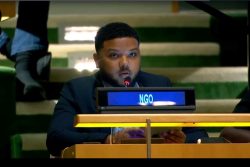Having clinched the general elections and now in the process of forming the government, all eyes will be on APNU+AFC’s pledges for the first 100 days.
In their manifesto for the closely-fought May 11th campaign, the alliance made a number of promises that they pledged would be kept in their first 100 days in office including to reduce the Berbice River Bridge toll. Government workers would be looking forward to salary increases while Guyanese have also been promised that the Value Added Tax (VAT) would be reduced and the tax removed from food and other essential items.
In the next 100 days, the coalition also said that it would increase old age pensions. It would also recommend and refer to a special select committee of the National Assembly, a reduction of the presidential pension. Guyanese would be looking forward to the establishment of passport and birth certificate offices in Berbice, Essequibo and Linden and Lindeners expect the return of a television station to the town.
Also on the agenda would be the waiving of duties on fuel, tools and small-scale mining equipment bought by identifiable holders of small concessions and the establishment of the long talked about Public Procurement Commission. In this period as well, a date would be set for the holding of Local Government Elections and the establishment of a National Rice Farmers and Rice Millers conference. A cane workers and cane farmers conference would also be held.
The new government during this period has also pledged to establish an investigative commission on corruption and task forces on crime and security and road safety. A conference of women will also be held and a bi-partisan women’s working group is expected to be established as part of healing the nation and the national unity thrust of the coalition. It is expected that the gender policy will be collectively drafted by women from across Guyana as an output from the conference.
Importantly, a Code of Conduct will be established for parliamentarians, ministers and others holding high positions in government public office to abide by and this would include mechanisms for demitting office if in violation of the code.
The National Youth Council is also expected to be convened and its mandate, terms of reference and programme of action produced for endorsement at a National Youth Conference. Also on the list is an Indigenous People’s Rights & Resources Conference to be held and the National Toshaos Council will be re-assessed and depoliticized.
Another important aspect of the 100 days programme is the liberalization of the telecommunications and ICT sectors and the adoption of a long-term sustainable economic development plan to realise the vast potential of the country and also the implementation of an amended Anti-Money Laundering and Countering the Financing of Terrorism Act.
Meantime, according to the Cummingsburg Accord which established the alliance, the AFC is guaranteed 12 seats in the 11th Parliament and in the new government, the alliance would also be allowed two vice-presidents both of whom will be members of Cabinet while APNU will have one vice-president.
As per the Accord, President David Granger as Head of State would be the Head of Government, Commander-in-Chief of the Armed Forces and shall have responsibility for the appointment of Constitutional Agencies and Commissions with the required and agreed democratic mechanisms of consultation and appointment. He would also be responsible for Foreign Affairs, International Relations and Non-Commercial Treaties, National Security Policy, the Defence Board, the Joint Intelligence Committee, and the Guyana Defence Force.
The President would delegate the following responsibilities to Prime Minister designate Moses Nagamootoo: domestic national affairs and chairing Cabinet; recommending ministerial appointments and providing the organisational structures of ministries for the approval of the President; appoint heads of agencies and non-constitutional commissions with the required and agreed democratic mechanisms of consultation and appointment; and domestic security (Home Affairs).
The parties also agreed that Cabinet positions will be allocated on a 60/40 basis between APNU and the AFC respectively and the Speaker of the National Assembly will be selected by both parties from independent members of civil society.







